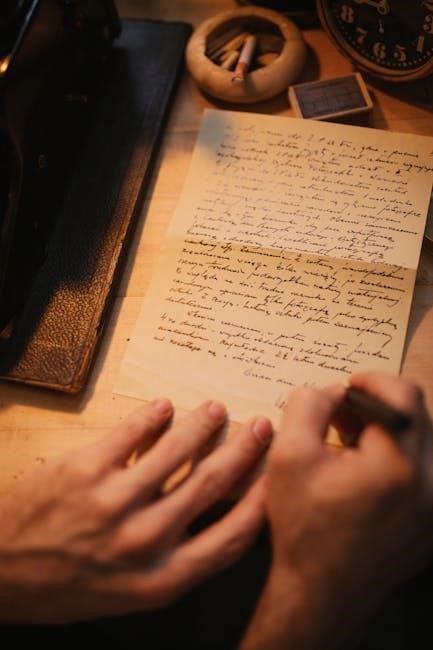The poem, I Am Joaquin, written by Rodolfo Corky Gonzales, is a powerful exploration of Chicano identity and cultural heritage. Available in PDF format, it is widely accessible for reading and study. The poem delves into themes of struggle, resilience, and the tension between tradition and modernity, making it a significant work in Chicano literature.
It serves as a declaration of identity and a reflection on the historical and cultural experiences of Mexican Americans, resonating deeply with its audience.
Overview of the Poem and Its Significance
“I Am Joaquin”, written by Rodolfo Corky Gonzales in 1967, is a poignant and powerful expression of Chicano identity. The poem explores themes of cultural heritage, struggle, and resilience, resonating deeply with Mexican Americans. It captures the tensions between tradition and modernity, reflecting the complexities of identity in a society dominated by Anglo culture. Available in PDF format, the poem is widely accessible, ensuring its message reaches a broad audience. Its significance lies in its ability to articulate the collective experiences of Chicano people, making it a cornerstone of Chicano literature and a vital resource for understanding the community’s history and aspirations.
Historical Context of the Poem
“I Am Joaquin” emerged during the 1960s, a time of heightened activism and identity formation within the Chicano Movement. The poem reflects the struggles of Mexican Americans navigating cultural erasure, discrimination, and systemic oppression. Written in 1967 by Rodolfo Corky Gonzales, it coincided with key events like the Chicano Moratorium and the land grant movement, which sought to reclaim lost heritage and fight for civil rights. The poem captures the spirit of resistance and pride, resonating with a generation seeking to assert their identity and challenge societal injustices. Its historical context underscores its role as a powerful anthem for Chicano empowerment and cultural affirmation.
Availability of the Poem in PDF Format
“I Am Joaquin” is widely available in PDF format, making it accessible for readers and scholars. The poem can be downloaded from various academic and literary websites, often as part of study guides or collections of Chicano literature. Many educational institutions and online archives provide free access to the PDF version, enabling easy distribution and study. Additionally, the poem is included in anthologies and publications focused on Chicano studies, ensuring its reach to a broad audience. Readers can also find it through libraries or by purchasing digital copies from reputable sources, ensuring accessibility while respecting copyright regulations.

The Author: Rodolfo Corky Gonzales
Rodolfo “Corky” Gonzales was a renowned poet, activist, and leader in the Chicano Movement. His work, including I Am Joaquin, remains pivotal in Chicano literature and identity.
Biography of Rodolfo Corky Gonzales
Rodolfo “Corky” Gonzales was born on March 18, 1927, in Denver, Colorado, to a family of Mexican descent. He grew up in a working-class neighborhood, which deeply influenced his later activism. Gonzales excelled in boxing and attended college on a scholarship before becoming a civil rights leader. His poem I Am Joaquin became a cornerstone of Chicano literature. Gonzales co-founded the Crusade for Justice, advocating for Chicano rights. His life bridged poetry, activism, and community empowerment, leaving a lasting legacy in both literature and social justice movements. His work continues to inspire exploration of identity and cultural pride.
Gonzales’ Role in the Chicano Movement
Rodolfo Corky Gonzales was a pivotal figure in the Chicano Movement of the 1960s and 1970s. His poem I Am Joaquin became an anthem for the movement, articulating the struggles and aspirations of Mexican-Americans. Gonzales co-founded the Crusade for Justice, a Denver-based organization that fought for Chicano civil rights, education, and economic empowerment. He championed bilingual education, cultural pride, and self-determination, inspiring a generation to reclaim their heritage. His leadership extended to organizing protests, conferences, and community programs, fostering unity and activism within the Chicano community. Gonzales’ work remains a cornerstone of the movement’s legacy, emphasizing identity, justice, and resistance.
His Literary Contributions Beyond “I Am Joaquin”
Beyond I Am Joaquin, Rodolfo Corky Gonzales contributed significantly to Chicano literature through his poetry, plays, and essays. His works often explored themes of identity, resistance, and cultural pride, resonating deeply with the Chicano community. Gonzales also wrote The Revolution in Baviera, a play that reflected the struggles and aspirations of Chicanos. His literary output expanded the scope of Chicano literature, offering diverse perspectives on the experiences of Mexican-Americans. Gonzales’ writings continue to be celebrated for their authenticity and impact, preserving his legacy as a vital voice in the Chicano Movement and beyond.

Themes and Messages in “I Am Joaquin”
The poem explores identity, cultural heritage, and resilience, highlighting the Chicano struggle. It reflects the tension between tradition and modernity, emphasizing pride and unity in diversity.

Identity and Cultural Heritage
The poem delves into the Chicano experience, exploring the blending of Mexican and American identities. It portrays Joaquin as a symbol of the Chicano struggle, embracing both his indigenous and Spanish roots while navigating the complexities of modern life. The use of bilingualism reflects the cultural duality, emphasizing pride in heritage. Gonzales highlights the richness of Mexican culture, from the Aztec empire to the present, celebrating traditions, language, and history. The poem serves as a declaration of self-discovery, urging Chicanos to reclaim their identity and honor their ancestors’ legacy. It bridges the past and present, fostering unity and pride in cultural heritage.
Struggle and Resilience
The poem vividly portrays the struggles faced by the Chicano community, reflecting a history of oppression, loss, and resistance. Joaquin embodies the collective pain of displacement, from the theft of land after the Mexican-American War to the marginalization of Chicano culture. Yet, the poem also celebrates resilience, highlighting the enduring spirit of a people who refuse to be erased. Through powerful imagery, Gonzales depicts the fight for justice and equality, drawing strength from cultural roots and ancestral legacy. The poem becomes a rallying cry, urging Chicanos to rise above adversity and reclaim their rightful place in society. It honors the past while inspiring hope for the future.
Conflict Between Tradition and Modernity
The poem explores the tension between preserving cultural traditions and embracing modernity, a central dilemma for Chicanos. Joaquin grapples with the loss of ancestral lands and the erosion of cultural identity, contrasting the richness of his heritage with the alienation of urban life. The poem reflects the struggle to maintain pride in Indigenous and Mexican roots amidst the pressures of assimilation. Gonzales highlights the internal conflict of reconciling the past with the present, advocating for a balance that honors tradition while adapting to contemporary realities. This duality resonates deeply, offering a powerful exploration of identity and cultural survival in a rapidly changing world.

Structure and Style of the Poem
The poem employs free verse, blending emotional intensity with contrasting imagery, creating a rhythmic flow that underscores Joaquin’s internal conflict and cultural identity exploration.
Use of Bilingualism in the Poem
The poem incorporates bilingualism to reflect the blending of cultures and identities central to the Chicano experience. Spanish and English intertwine seamlessly, mirroring the duality of Joaquin’s heritage. This linguistic mix emphasizes the struggle to preserve cultural roots while adapting to a dominant Anglo society. Bilingualism also serves as a tool for authenticity, connecting readers to the richness of Mexican and Mexican-American traditions. By alternating languages, Gonzales creates a vivid representation of the internal and external conflicts faced by Joaquin, making the poem accessible and deeply resonant for bilingual readers. This approach highlights the beauty of cultural duality and the tension it often entails.
Symbolism and Imagery
The poem is rich in symbolism and imagery, which deepen its emotional and cultural resonance. Aztec pyramids, the Virgin of Guadalupe, and the Mexican Revolution evoke a sense of historical and spiritual identity. The desert and the river symbolize the harsh realities of survival and the nourishing flow of cultural heritage. The eagle and serpent from the Mexican flag represent strength and the struggle for freedom. These symbols, along with vivid imagery of blood, sweat, and tears, emphasize the sacrifices and resilience of the Chicano people. Gonzales uses these elements to paint a powerful picture of identity, struggle, and hope, making the poem visually and emotionally impactful.
Rhetorical Devices and Their Impact
Rhetorical devices in “I Am Joaquin” amplify its emotional depth and thematic clarity. Repetition, such as the refrain “I am Joaquin,” reinforces identity and unity with heritage. Alliteration enhances rhythm, making the poem memorable and impactful. Imagery vividly portrays the Chicano experience, evoking strong emotions through depictions of struggle and resilience. Metaphors and similes draw relatable comparisons, while anaphora emphasizes key emotional points. These devices collectively create a powerful narrative, making the poem both emotionally resonant and intellectually engaging. They highlight the tension between tradition and modernity, enriching the exploration of cultural identity and the Chicano struggle, ensuring the poem’s enduring relevance and emotional connection with readers.

Historical and Cultural References
The poem blends Mexican and American experiences, referencing the Aztec Empire, Spanish conquest, and Mexican Revolution, celebrating Chicano heritage and resilience through historical and cultural imagery.
References to Mexican and Mexican-American History
The poem “I Am Joaquin” is deeply rooted in Mexican and Mexican-American history, reflecting the struggles and triumphs of the Chicano people. It references the Aztec Empire, symbolizing indigenous pride, and the Spanish conquest, highlighting cultural blending. The Mexican Revolution is also invoked, emphasizing resistance and resilience. The poem further touches on the experiences of Mexican-Americans, including migration, labor struggles, and the fight for identity. These historical allusions serve to empower the Chicano community by connecting them to their heritage. Gonzales’ work bridges the past and present, celebrating cultural endurance and the blending of traditions.
Figures Mentioned in the Poem
The poem “I Am Joaquin” references several key figures from Mexican and Chicano history, underscoring their importance to the narrator’s identity. Cuauhtémoc, the last Aztec emperor, symbolizes resistance and pride. Emiliano Zapata, a leader of the Mexican Revolution, represents the fight for land and justice. Additionally, the poem mentions Benito Juárez, a champion of Mexican liberalism, and Frida Kahlo, whose art embodies the spirit of Mexican culture. These figures highlight the blend of indigenous, revolutionary, and cultural icons that shape the Chicano experience. By invoking these names, Gonzales connects the personal journey of Joaquín to a broader historical and cultural legacy.
Cultural Symbols and Their Significance
The poem “I Am Joaquin” is rich in cultural symbols that reflect the Chicano experience. The Aztec eagle and serpent symbolize indigenous pride and resilience, while the Virgin of Guadalupe represents spiritual strength and cultural identity. La Llorona, the Weeping Woman, embodies sorrow and the enduring spirit of Mexican folklore. The Rio Grande serves as a border symbol, highlighting the division and connection between cultures. These symbols collectively weave a tapestry of heritage, blending indigenous, colonial, and modern influences. They evoke a sense of pride and conflict, mirroring the narrator’s internal struggle to reconcile his past with his present identity.

Impact and Legacy of “I Am Joaquin”
“I Am Joaquin” empowered the Chicano Movement, inspiring art, activism, and identity pride. Its influence endures, sparking conversations on cultural resilience and social justice, remaining a powerful anthem.
Influence on Chicano Literature
“I Am Joaquin” became a cornerstone of Chicano literature, voicing the struggles and pride of Mexican-Americans. Its vivid imagery and bilingual style inspired a generation of writers to explore identity and cultural duality. The poem’s themes of resilience and heritage resonated deeply, making it a foundational text in Chicano studies. It influenced works that celebrated Latino experiences, fostering a literary movement that emphasized self-expression and cultural pride. Gonzales’ masterpiece remains a powerful symbol of literary activism, shaping the narrative of Chicano identity and continuing to inspire writers and artists today.
Role in the Chicano Civil Rights Movement
“I Am Joaquin” played a pivotal role in the Chicano Civil Rights Movement, becoming an anthem for identity and empowerment. Its powerful message resonated with Mexican-Americans fighting for equality and justice. The poem’s themes of pride, resistance, and cultural heritage inspired activists to embrace their roots and challenge systemic oppression. It became a rallying cry during protests and community organizing, embodying the spirit of the movement. By articulating the struggles and aspirations of Chicanos, Gonzales’ work helped galvanize a generation to demand rights and recognition, leaving a lasting impact on the fight for social justice and equality.
Modern Relevance and Continued Popularity
“I Am Joaquin” remains highly relevant today, resonating with contemporary discussions on identity, culture, and social justice. Its themes of self-discovery and resilience continue to inspire new generations. The poem is widely studied in educational settings, sparking important conversations about heritage and empowerment. Its availability in PDF format has made it easily accessible, ensuring its popularity endures. Digital platforms and social media have further amplified its reach, introducing it to younger audiences. The poem’s timeless message aligns with modern movements for equality, solidifying its place as a cornerstone of Chicano literature and a powerful symbol of cultural pride and resistance.

Study Guide and Analysis
The “I Am Joaquin” poem PDF offers a comprehensive study guide, enabling deep analysis of its themes, historical context, and cultural significance. It aids educational exploration effectively.
Key Questions for Understanding the Poem
To deeply understand I Am Joaquin, consider these questions: How does the speaker’s identity evolve throughout the poem? What historical events shape the narrative? How does bilingualism enhance meaning? What symbols represent cultural heritage? How does the poem address the clash between tradition and modernity? What role does resilience play in the struggle depicted? How does Gonzales’ personal experience influence the work? What message does the poem convey about unity and self-discovery? These questions guide readers to explore themes, historical context, and literary devices, fostering a richer analysis of the poem’s significance and relevance to Chicano identity and culture.
Analysis of Specific Lines and Passages
The poem I Am Joaquin captivates readers with its profound exploration of identity and cultural heritage. A significant line, “I am Joaquin, / Lost in a world of confusion,” introduces the central theme of identity, highlighting the speaker’s internal conflict. This line sets the tone for the poem, reflecting the Chicano experience of navigating multiple cultural influences. Another impactful passage, “I am the masses of my people,” symbolizes collective resilience, emphasizing the shared struggles and strengths of the Chicano community. The imagery in “In the silence I heard / my fathers / beating the drums” evokes a strong connection to ancestral heritage, showcasing the enduring spirit of the culture. The duality expressed in “I am the sword and the shield” represents the balance between fighting for rights and preserving tradition. The strategic use of bilingualism, such as switching between English and Spanish, adds authenticity and depth to the narrative. Lines like “I have come a long way to arrive at this place” illustrate the journey of self-discovery and the blending of old and new. These passages collectively build a powerful narrative of identity, heritage, and the quest for unity, resonating deeply with readers.
Teaching the Poem in Educational Settings
Teaching I Am Joaquin in classrooms offers a powerful way to explore themes of identity, culture, and social justice. Educators can use the poem to foster discussions about the Chicano experience and its relevance to broader societal issues. Assigning group analyses of specific passages encourages collaboration and deeper understanding. Teachers can also incorporate historical context to help students appreciate the poem’s roots in the Chicano Movement. Encouraging personal reflections allows students to connect their own identities to Joaquin’s journey. Using the PDF version of the poem ensures accessibility, while supplementary materials like discussion guides can enhance engagement. This approach not only enriches literary study but also promotes cultural awareness and empathy.
I Am Joaquin remains a profound exploration of identity, culture, and resilience, offering timeless lessons on heritage and justice. Its enduring relevance inspires reflection and unity across generations.
Final Thoughts on the Poem’s Importance

I Am Joaquin stands as a monumental piece of Chicano literature, encapsulating the essence of identity, culture, and the enduring struggle for justice. Its bilingual form bridges linguistic divides, reflecting the duality of the Chicano experience. The poem’s universal themes of resilience and the quest for equality resonate deeply, making it a vital educational tool. By preserving the voices and stories of a marginalized community, it ensures their history and aspirations are not forgotten. Its availability in PDF format has broadened its reach, allowing new generations to engage with its powerful message. As a cultural artifact, it continues to inspire reflection and unity, underscoring the importance of preserving heritage and striving for a more equitable future.

Encouragement to Read and Share the Poem
Reading I Am Joaquin is an empowering experience that connects readers to the heart of Chicano identity and resilience. Sharing the poem amplifies its message of unity and cultural pride, inspiring others to reflect on their own heritage. With its availability in PDF format, it’s easier than ever to distribute and discuss in classrooms, community groups, or online platforms. By engaging with this powerful work, individuals can gain a deeper understanding of the struggles and triumphs of the Chicano community. Share it widely to ensure its timeless themes continue to resonate and inspire future generations to embrace their roots and strive for justice.